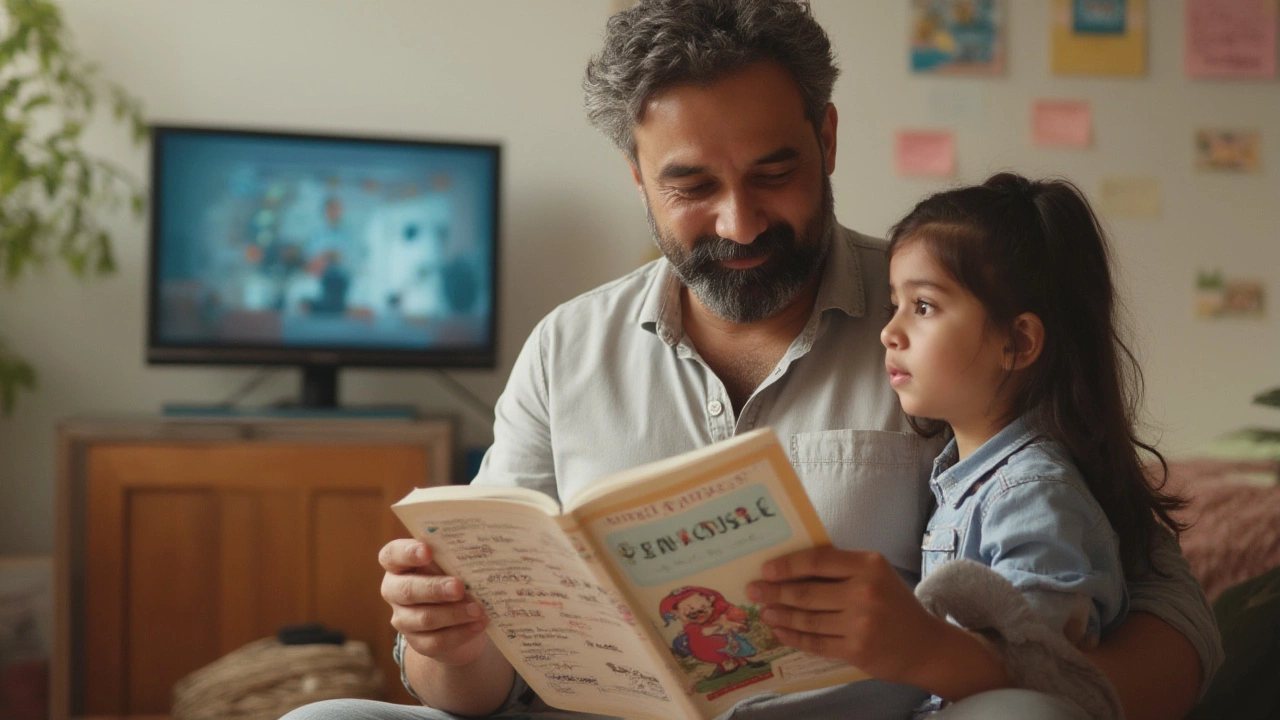How to Learn Basic English for Free: Easy Tips and Best Online Resources
 Jul, 21 2025
Jul, 21 2025
English can sneak up on you when you least expect it. Maybe you've wanted to watch shows without subtitles, or order your favorite fast food overseas and finally ditch the awkward hand gestures. The good news? You don't have to break the bank to pick up basic English these days. That's right, you can build a strong foundation without paying a single rupee, dollar, or whatever currency your wallet hides. Learning a language has never been more accessible—mobile in your hands, Wi-Fi streaming through the air, and more legit options than ever before.
Free Online Resources That Actually Work
Here’s the kicker—hundreds of free sites promise the world, but sifting through them feels like scrolling endless memes when you're supposed to be studying. So let’s get real about what actually helps most beginners get unstuck. If you want to learn basic English, it pays to stick to tried-and-true resources, and to build a habit around them. That's the secret sauce most language learners miss.
First, let’s talk about Duolingo. It’s not just for memes. As of 2025, it’s the world’s most popular language learning platform, counting 600 million users. The app walks you through reading, listening, and speaking basic words and phrases, and best of all, it’s free to use. The only catch? Ignore the paid version’s constant temptation. Knock out 10-minute daily lessons, and you’ll be amazed how quickly your brain files words like "apple" and "hello". But Duolingo isn’t perfect—its instruction can get repetitive, so use it as a starter, not the only solution.
BBC Learning English is a hidden goldmine. It offers real news stories, fun drama series, pronunciation practice, and even grammar lessons in bite-sized chunks. If you want to hear how English sounds in real-world use and pick up new words daily, give it a go. There are free quizzes, audio, and even live classes when you outgrow just greeting people or saying "I like pizza".
ESL Fast and British Council’s LearnEnglish section are also favorites among teachers. ESL Fast has over 1,500 conversations and quizzes that sound natural—no overly polished "classroom English." British Council’s site is led by education experts with lessons organized by level. Their games and stories are especially solid for beginners.
YouTube shouldn’t be underestimated either. Search for "Learn English for beginners" and you’ll find entire channels with free video series. English Addict with Mr. Duncan stands out—he’s upbeat and explains things in simple, real language. Rachel’s English is ideal if you hope to sound clear when speaking. You’re watching millions of minutes of English for free and can even slow down videos to catch tricky phrases.
Want something social? Try HelloTalk or Tandem, both free apps where you find native English speakers looking to learn your language. You trade messages, voice notes, or calls. That’s free practice with people everywhere, no teachers or pressure. Even a few short exchanges a day boost your real-world English much faster than copying words from a textbook.
Sometimes, things can feel overwhelming, with so many resources floating around. A good tip: pick just one or two sites you enjoy, commit to 15 minutes daily, and don’t stress about “completing” everything. Language is more marathon than sprint.

Daily Habits to Cement Your Basics
The internet is stacked with English lessons, but real progress comes from daily routines anyone can start without a teacher. The trick isn’t to learn all the grammar rules or every word at once—it’s about weaving English into your normal life. Think of it like brushing your teeth: a little, every day, and soon it doesn’t even feel like work.
Reading out loud is a power move. Grab anything in English—signs, labels, short articles, even a kid’s book—and just say the words. Don’t worry about messing up. Your tongue and brain start working together, and soon forming simple sentences gets easier. The same goes for singing along to your favorite English songs. Music sticks; your memory grabs the phrases without much effort.
Another nugget: keep a tiny notebook or start a digital note on your phone. Whenever you hear or read a new word, jot it down with its meaning and a sentence. Review the list before bed for five minutes. As basic as it sounds, dozens of studies have shown writing stuff down by hand locks it into your mind much better than looking at it once and moving on.
Set your phone or favorite apps to English. Suddenly, you’re learning menu terms and everyday words without extra study time. Ordering a cab? Swiping through Instagram? All those little interactions stack up and keep your brain practicing even if you’re just relaxing.
Here’s another sneaky hack: watch movies and TV shows with English subtitles turned on—especially things you’ve already seen in your native language. Your brain knows the story, so it starts matching English words to actions and ideas. It’s slow at first, but you’ll notice the same words popping up again and again. Cartoons or sitcoms aimed at kids use simple language and cleaner pronunciation. Beginners often find Peppa Pig, Pocoyo, and other global favorites surprisingly effective, even for adults.
If you’ve got access to a library, borrow picture dictionaries or basic readers. Some big public libraries offer free online access too, with audiobooks to go along with the text. Listen and read along for double impact.
Feeling stuck? Speak to yourself in the mirror, even if it’s just "Today is sunny" or "I am drinking tea." It’s free, there’s no audience, and you get comfortable hearing your own voice in English. Plenty of folks do this—even some top actors practice this way when prepping for roles in a different language.
Use social media smartly. Follow a couple of English meme pages, celebrities, or public figures you like. Scrolling through posts in English and reading comments turns downtime into language practice. Leave an emoji or a short comment if you’re feeling bold—the internet is a surprisingly forgiving teacher.
Finally, consistency beats cramming. Research by Cambridge University Press recently showed students who practice language in short, daily bursts retain triple the words compared to those who study in long, irregular marathons. Aim for at least 10–15 minutes per day—for most beginners, that’s enough to see progress without burning out.

How to Track Progress and Stay Motivated
Start with a personal checklist. Write out 10 phrases you want to master—maybe things like "Where is the bathroom?" or "How much does this cost?" Each time you use one in conversation, check it off. Keep the list visible on your wall or fridge. Seeing boxes ticked off is weirdly satisfying, and reminds you that English really is getting easier, word by word.
Try regular self-quizzes, but keep it light. Every week, read a short paragraph or listen to a simple English podcast, then summarize one sentence in your own words. If you get stuck, that’s okay—review the problem words and try again next week. This isn’t about getting everything perfect; it’s about noticing how things get a little less tricky over time.
Language learning platforms like Duolingo and Memrise offer gamification—points, badges, leaderboards. These aren’t just for kids. Studies show gamified learning keeps adult learners motivated for twice as long. Set your profile photo, turn on notifications, and aim for tiny streaks—like 5 days in a row. Miss a day? Life happens. Just pick it back up. No guilt.
Meet a friend or family member who wants to learn English too. Set a mini-challenge: who can remember the most new words in a week? Or make silly two-word English sentences and see who cracks up first. Learning English alone is fine, but every interaction—even a laugh—anchors new words a little deeper in your memory.
Set up reminders for yourself, and use rewards you actually like. Maybe finish a week of daily lessons, and then treat yourself to a movie night, a favorite snack, or a day off from any serious studying. Rewards don’t have to be grand—just something to signal, “Hey, I stuck with it.”
It helps to track your progress with real data. Here’s a simple table you can use. Update it each week:
| Week | New Words Learned | Minutes Practiced | Speaking Attempts |
|---|---|---|---|
| 1 | 15 | 70 | 3 |
| 2 | 22 | 80 | 4 |
| 3 | 19 | 60 | 5 |
| 4 | 25 | 90 | 7 |
The numbers don’t have to be huge. Seeing steady growth—even tiny bumps—keeps you moving when motivation dips. If you speak just 10 sentences the first week, try for 15 the next. Over months, those baby steps add up to surprising confidence.
Sometimes you’ll fall off the wagon—a busy week, work stress, or just plain boredom. That’s normal. The internet is full of stories from people who paused and later picked up where they left off. Basic English isn’t about perfection, it’s about communicating and connecting, even if your grammar is messy at first.
Want a next-level boost? Once you’re comfortable, find a free online English speaking club. Many groups use apps like Zoom or Telegram and welcome beginners. Even saying "hello" in front of a stranger can banish nerves and build real speaking skill.
Remember, millions have learned English from scratch, using only free resources, good habits, and a pinch of stubbornness. Stick with it. Your favorite songs will make sense; new friendships suddenly feel possible. And yes, those fast-food orders will finally come out crystal clear.